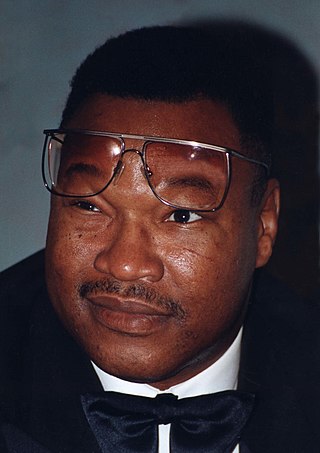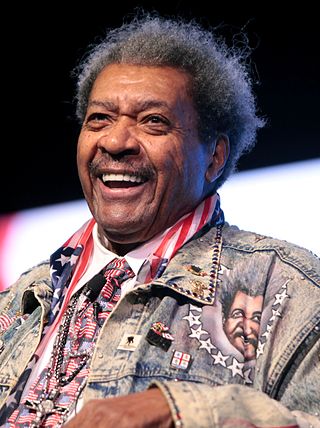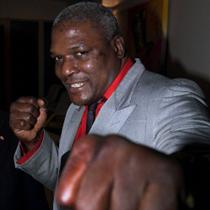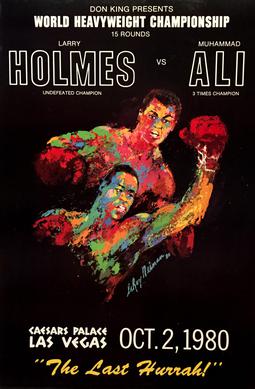
Muhammad Ali was an American professional boxer and activist. Nicknamed "the Greatest", he is regarded as one of the most significant sports figures of the 20th century and is often regarded as the greatest heavyweight boxer of all time. He held the Ring magazine heavyweight title from 1964 to 1970. He was the undisputed champion from 1974 to 1978 and the WBA and Ring heavyweight champion from 1978 to 1979. In 1999, he was named Sportsman of the Century by Sports Illustrated and the Sports Personality of the Century by the BBC.

Although women have participated in boxing for almost as long as the sport has existed, female fights have been effectively outlawed for most of boxing's history until recently, with athletic commissioners refusing to sanction or issue licenses to women boxers, and most nations officially banning the sport. Reports of women entering the ring go back to the 18th century.

Larry Holmes is an American former professional boxer who competed from 1973 to 2002 and was world heavyweight champion from 1978 until 1985. He is often considered to be one of the best heavyweight boxers of all time. He grew up in Easton, Pennsylvania, which led to his boxing nickname of the "Easton Assassin".

Kenneth Howard Norton Sr. was an American professional boxer who competed from 1967 to 1981. He is often considered One of Greatest Heavyweight boxers of All Time. He was awarded the WBC world heavyweight championship in 1978, after winning a close split decision over Jimmy Young in a title eliminator bout and Leon Spinks refused to fight with him.

Donald King is an American boxing promoter, known for his involvement in several historic boxing matchups. He has been a controversial figure, partly due to a manslaughter conviction and civil cases against him, as well as allegations of dishonest business practices by numerous boxers.

Leon Spinks was an American professional boxer who competed from 1977 to 1995. In only his eighth professional fight, he won the undisputed heavyweight championship in 1978 after defeating Muhammad Ali in a split decision, in what is considered one of the biggest upsets in boxing history. Spinks was later stripped of the WBC title for facing Ali in an unapproved rematch seven months later, which he lost by a unanimous decision.
Jimmy Young was an American heavyweight professional boxer. Young was known for his awkward, defensive style and counterpunching. He was one of the top contenders of the 1970s, most notably earning a victory over George Foreman in 1977 and losing a unanimous decision against Muhammad Ali in 1976. Young fought many significant fighters of his era, including twice outpointing Ron Lyle and losing only by a split decision to then-number one contender Ken Norton in a title eliminator in late 1977. A fellow boxer, Bobby Watts, was his cousin.

Earnie Dee Shaver, best known as Earnie Shavers, was an American professional boxer who competed between 1969 and 1995. A two-time world heavyweight championship challenger, he is known as one of the hardest punchers in heavyweight boxing history. He scored 70 knockout wins, including 23 in the first round, for a 76.7% overall knockout rate.

Ronald David Lyle was an American professional boxer who competed from 1971 to 1980, and in 1995. He challenged unsuccessfully for the world heavyweight championship, losing to Muhammad Ali in 1975. Known for his punching power, crowd-pleasing fighting style, and his courage and determination in the ring, Lyle defeated Buster Mathis, Oscar Bonavena, Jimmy Ellis, Vicente Rondón, Earnie Shavers, Joe Bugner, and Scott LeDoux, but is best known for his fight against George Foreman in 1976, which was voted Fight of the Year by The Ring magazine.
Jerry Quarry, nicknamed "Irish" or "The Bellflower Bomber", was an American professional boxer. During the peak of his career from 1968 to 1971, Quarry was rated by The Ring magazine as the most popular fighter in the sport. His most famous bouts were against Muhammad Ali. He is often seen as being one of the Best Heavyweight Boxers never to be Champion. He beat Heavyweight Champion Floyd Patterson and top contenders Ron Lyle, Earnie Shavers, Brian London, Thad Spencer, Buster Mathis, Randy Neumann ,Jack Bodell, Mac Foster and Eduardo Corletti. He accumulated damage from lack of attention to defense against larger men at the top level, no head guard sparring, and attempted comebacks in 1977, 1983 and 1992 resulted in Quarry developing an unusually severe case of dementia pugilistica.
During the 1970s, boxing was characterized by dominating champions and history-making rivalries. The decade had many superstars, who also had fierce rivals. Alexis Argüello, for example, who won the world Featherweight and Jr. Lightweight titles in the '70s, had to overcome Alfredo Escalera twice before the decade was over.

Trevor Berbick was a Jamaican professional boxer who competed from 1976 to 2000. He won the WBC heavyweight title in 1986 by defeating Pinklon Thomas, then lost it in his first defense in the same year to Mike Tyson. Berbick was the last boxer to fight Muhammad Ali, defeating him in 1981 by unanimous decision.

James Albert Ellis was an American professional boxer. He won the vacant WBA heavyweight title in 1968 by defeating Jerry Quarry, making one successful title defense in the same year against Floyd Patterson, before losing to Joe Frazier in 1970.

Brian Sidney Harper, known professionally as Brian London, was an English professional boxer who competed from 1955 to 1970. He held the British and Commonwealth heavyweight title from 1958 to 1959, and twice challenged for the world heavyweight title, losing to Floyd Patterson in 1959 and Muhammad Ali in 1966, both times via knockout. He was one of a quartet of British boxers, with Henry Cooper, Joe Erskine, and Dick Richardson, who dominated the British boxing scene throughout the 1950s and 1960s.
An exhibition fight is a sports match which is not part of a competition but instead serves the function of demonstrating the skills of the participants In boxing, an exhibition fight normally consists of three to eight rounds. The participants generally wear larger gloves to minimize punch harm or impact on the combatants, headgear, and non-boxing related clothing. Exhibition fights involve opponents exhibiting their skills while usually being friendly and respectful.

Larry Holmes vs. Muhammad Ali, billed as "The Last Hurrah!", was a professional boxing bout contested on October 2, 1980 in Las Vegas for the WBC and vacant The Ring heavyweight championships.
Muhammad Ali visited India on multiple occasions to participate in exhibition boxing matches, to visit schools and orphanages supported by his foundation, and for other private visits.
Muhammad Ali and Earnie Shavers fought each other in a 15-round boxing match on September 29, 1977. The 10th title defense by Ali since regaining the championship, the fight went the distance with Ali winning by unanimous decision.

Muhammad Ali is widely regarded by many boxing commentators and historians as the greatest heavyweight boxer of all time. Boxing magazine The Ring named him number 1 in a 1998 ranking of greatest heavyweights from all eras. In 1999, The Associated Press voted Ali the number one heavyweight of the 20th century. In 1999, Ali was named the second greatest boxer in history, pound for pound, by ESPN; behind only welterweight and middleweight legend Sugar Ray Robinson. In December 2007, ESPN listed Ali second in its choice of the greatest heavyweights of all time, behind Joe Louis. He was inducted into the International Boxing Hall of Fame in the inaugural class of 1990.
Kaur Singh was an Indian heavyweight champion boxer from Punjab. Singh won three gold medals for senior national boxing championship, Asian Boxing Championship and Asian Games.












